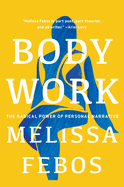
In Body Work, her fourth book, Melissa Febos (Girlhood) delivers a boldly feminist essay collection that explores how autobiographical writing can help one face regrets and trauma and extract meaning from the "pliable material" of memory. Composed of four long essays, this concise yet weighty work offers writing as "a primary means of digesting and integrating... experiences and thereby reducing the pains of living."
The essay "In Praise of Navel Gazing" affirms the importance of women airing their stories of abuse and thereby challenging the power structures that aim to keep victims silent. Febos, a former dominatrix, explains in "Mind F---: Writing Better Sex" how she asks her writing students to produce five-sentence sexual histories to force them past familiar tropes. A sex scene is crafted like any other, she insists, with unlimited vocabulary (and the sex depicted doesn't even have to be good). She quotes from successful sex writing by the likes of Garth Greenwell and Cheryl Strayed. "A Big Shitty Party" warns of the dangers of writing about real people; Febos advises readers to take out the specifics--and any cruelty--and to run a draft, if possible, past the people portrayed as main characters. "The Return" employs religious language for the transformation writing can achieve: a change of heart and a confessional attitude are the keys to gaining necessary perspective on an experience.
These forthright essays make a clear case for writing as (incidentally) therapeutic. Practical and empowering, they prepare would-be writers for an "emotional confrontation with the self." --Rebecca Foster, freelance reviewer, proofreader and blogger at Bookish Beck

